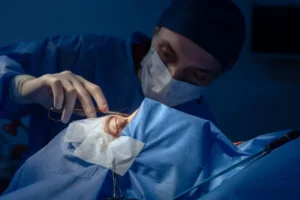Last Updated on 1 year ago by Nicky Johnson
Are you thinking about getting eyelid surgery? This is a choice many make to enhance their eyelids’ look or to solve health issues. If you’re excited about seeing the results, it’s just as important to know what to expect after the operation.
In this blog post, we take a look through the usual recovery journey. We’ll cover how long recovery typically takes and what complications you should be on the lookout for.

What is eyelid surgery?
Blog Contents
Eyelid surgery is a procedure where a surgeon operates on your eyelids to refresh their appearance or fix any problems. Some opt for this surgery because they have sagging or droopy eyelids, which make them seem older or more tired than they feel. Others might need it to address a health concern, such as a droopy eyelid impairing their sight. Regardless of the reason, the surgery aims to improve how you look or see by altering your eyelids.
Usual recovery times
Immediate care (first 48 hours)
Right after your eyelid operation, you might feel a bit woozy or confused, especially if you are under general anesthesia. You’ll likely stay a few hours in the hospital or clinic so the team can ensure you’re alright before you head home. They’ll give you some initial care instructions, like how to clean the area and which eye drops or ointments to use.
First week
During the first week post-surgery, expect some swelling and bruising around your eyes. It might seem darker or more swollen than usual, but that’s normal. You might also find your eyes more sensitive to light at this time. If you’ve had stitches, they usually come out after a week. It’s wise to avoid strenuous exercise and keep your head raised as much as you can to help with the swelling.
Second week onwards
Moving into the second week, you’ll notice the swelling and bruising improving. The changes will become more visible as your eyes heal. By this time, most feel ready to resume their usual activities, though it’s still best to steer clear of heavy lifting.
Full recovery
Expect to wait around a month or so to see the final results and for all swelling and other symptoms to fully subside. You should then be able to enjoy your eyelids’ new look or enhanced functionality.
Remember, everyone heals differently, so your recovery could be quicker or slower than average. Always heed your healthcare provider’s advice for the best outcomes.
Possible complications
Typical side effects
After eyelid surgery, it’s common to experience some mild pain, itching, or a gritty sensation in your eyes. Blurry vision might also occur temporarily. These are typical side effects and are usually not much of a concern. Ensure you follow your doctor’s recommendations on managing them.
More severe complications
While most recover without major problems, you should be aware of more serious complications like infection, significant bleeding, or vision issues. If you experience severe pain, a lot of discharge, or sudden vision loss, contact your healthcare provider immediately.
Reducing risks
To lower the risk of complications, closely follow your healthcare provider’s pre- and post-surgery instructions. This may include pausing certain medications before your surgery or taking specific antibiotics afterwards to prevent infection.
Being alert to any signs of trouble and promptly contacting your healthcare provider if concerned can smooth your recovery and help you avoid severe complications.
Being well-informed and closely following medical advice are crucial steps for a successful recovery.
After-surgery care advice
Proper care after eyelid surgery is vital for a smooth and quick recovery. Here are some simple tips for taking care of the operated area:
Cleaning
Your healthcare provider will probably prescribe special eye drops or ointments to keep the area clean. Use them as instructed to ward off infection.
Sleeping position
Sleeping with your head raised for the initial days post-surgery can help minimise swelling and increase comfort.
Medication
You may receive medication for pain control or to prevent infection. Take these as directed, without missing doses.
Avoiding certain activities
For the first few weeks, avoid activities that could strain your eyes or increase head blood flow, like bending over, lifting heavy things, or intense exercise. Also, try not to rub your eyes.
Sunglasses and suncream
With increased sensitivity to light and UV rays, wear sunglasses outdoors and steer clear of direct sunlight on your face. Some doctors even suggest applying sunscreen to the healed scar area to prevent darkening.
Regular check-ups
Attend all follow-up appointments so your healthcare provider can track your recovery and address any issues.
By sticking to these tips and your healthcare provider’s advice, you’re on the path to a more comfortable and successful recovery.
Seeking legal advice
If you’re not satisfied with the outcome of your blepharoplasty and believe it might be due to cosmetic surgery negligence, contact a cosmetic surgery solicitor. They can provide you with the necessary guidance and support to explore your options and potentially seek compensation. Remember, it’s important to act swiftly to ensure your case is evaluated accurately and thoroughly.







